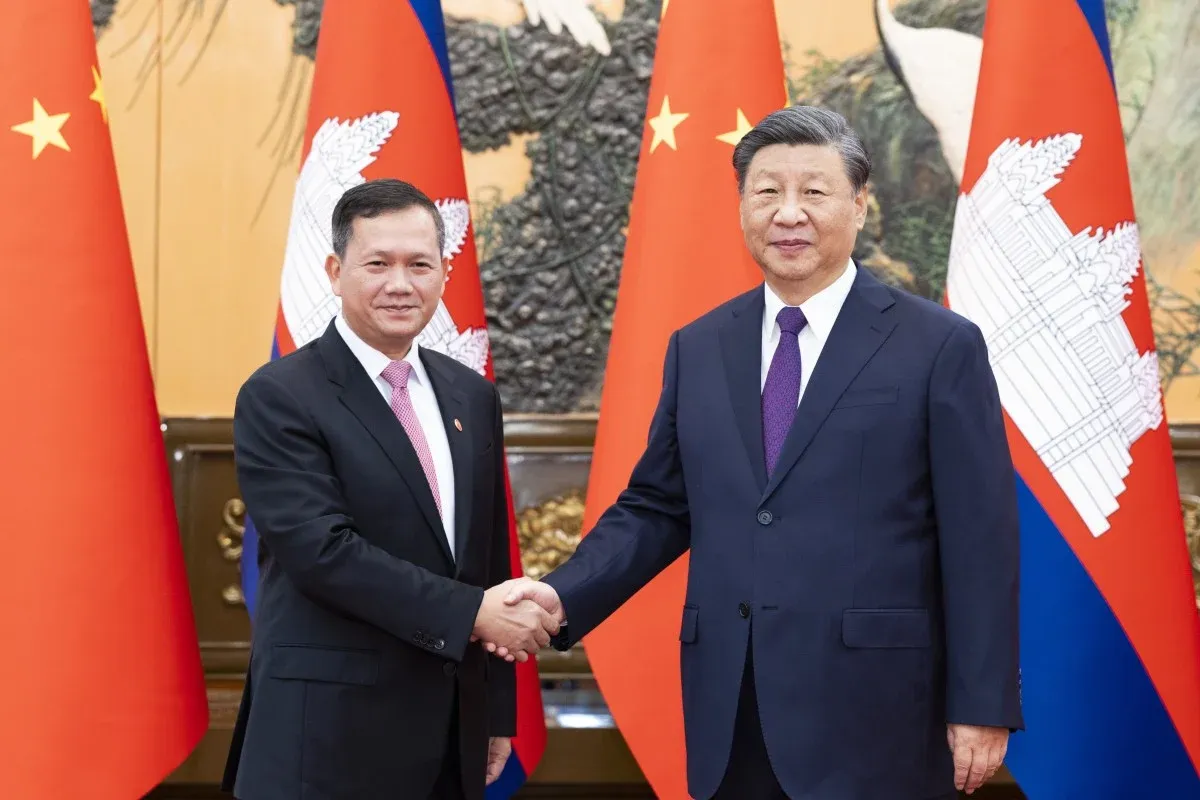China Extends Global South Diplomatic Streak with Cambodia, Zambia, and G77

The Lede: Last week, Chinese President Xi Jinping welcomed Cambodian Prime Minister Hun Manet and Zambian President Hakainde Hichilema to Beijing shortly after a visit by Venezuelan President Nicolas Maduro. The closer relations emerging from these bilateral visits signal a reiteration of China’s focus on cooperation and leadership among Global South countries as competition dominates relations with the Western-led developed sphere.
What We Know:
- On Friday, the Chinese and Zambian leaders announced the upgrade of their countries’ relationship to a comprehensive strategic cooperative partnership. China pledged an expansion of cooperation on infrastructure for agriculture, mining, clean energy, as well as increased investment by Chinese companies and cooperation on the Belt and Road Initiative. Hichilema began his trip in Shenzhen to visit Chinese companies including BYD, Tencent, Huawei, and ZTE.
- Aside from standing with Beijing on Taiwan, Manet called for expanding cooperation in infrastructure development, medical care, education, and tourism while Xi highlighted law enforcement and security measures to crack down on cross-border crimes.
- Friday and Saturday saw the two-day summit of the Group of 77 (G77) and China hosted in Havana, Cuba, which was attended by Li Xi, the secretary of the Central Commission for Discipline Inspection and the seventh-ranking member of the Chinese Communist Party. Brazil and Egypt followed Li’s agenda after Cuba.
- On Wednesday, the newly appointed Chinese ambassador to Afghanistan attended a welcome ceremony in Kabul.
The Background: The U.S. has previously responded negatively to Cambodia’s undemocratic governance and military cooperation with China. Cambodia has also been accused of supporting Chinese interests, particularly as it pertains to territorial disputes in the South China Sea. China has already implemented large investments in Zambia’s mining, infrastructure, and energy sectors. It is also part of China’s first mega infrastructure project in Africa, the Tanzania-Zambia railway, which was started in the 1970s and stretches from Zambia’s copper belt to Dar es Salaam at the Indian Ocean. In June, China and other bilateral creditors agreed to restructure Zambia’s $6.3 billion in loans. Formed in 1964 by 77 non-aligned nations, the G77 is a group of 134 countries and was formed to articulate and promote the collective economic interests of developing nations and to enhance joint negotiating capacity within the United Nations system. China is not considered a member, but it provides consistent political support and has made financial contributions. Thus, official statements from the group are delivered in the name of G77+China.
Likely Outcomes:
- Global South countries will likely continue to step more confidently into their own diplomatic focal points as the superpowers diverge and offer increasingly different visions of global order. It could certainly be the case that many countries in this category will shore up ties with China as Beijing assumes a kind of leadership role in the Global South. Still, most of these countries will keep a toe in the Western-led developed sphere as it still forms the structure of the current world system.
- The U.S. may start to make a more concerted effort to offer alternatives to China’s influence among these same countries, but it it likely too late to match Beijing’s early outreach and appeals to solidarity with its claims as a Global South country.
Quotables:
“We appreciate your role in positively altering the global order so that the Global South can take our rightful place in the league of nations.” – Hakainde Hichilema, President of Zambia
“China aspires to shape a system that aligns with its interests and recognizes its status as a great power. Achieving this goal requires enhancing its ability to influence global discourse, which can be accomplished through garnering more international support.” – Edward Chan, China studies fellow at Australian National University
“China has a near-term goal and also a long-term goal. The long term goal will be the number one in the world. But the near-term goal is to be the leader of the Global South.” – Alfred Wu, associate professor at the National University of Singapore’s Lee Kuan Yew School of Public Policy
"China has been very active in promoting a fairer economic and political order in keeping with the interests of developing countries. It has maintained a systematic and consistent policy supporting the multilateral bloc.” – Eduardo Regalado, senior researcher at the International Policy Research Center of Cuba
Good Reads:
Cambodian PM Hun Manet pledges stronger China ties in Beijing visit (Nikkei)
Cambodian PM Hun Manet heads to China in early diplomatic push (Nikkei)
China firms up ties with debt-laden, resource-rich Zambia (SCMP)
Cuba seeks to deepen ties with Beijing at G77+China summit (Nikkei)
China sends senior Communist Party envoy on G77 mission to Cuba (SCMP)
G77+China summit concludes with emphasis on empowering Global South (Xinhua)
Taliban welcomes China’s new ambassador to Afghanistan in lavish ceremony (CNN)
